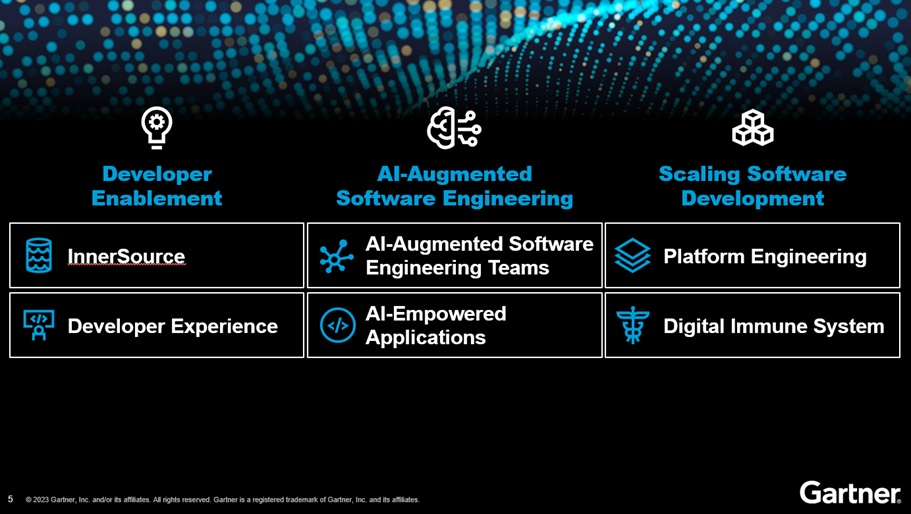JFrog announced a new machine learning (ML) lifecycle integration between JFrog Artifactory and MLflow, an open source software platform originally developed by Databricks.
Gartner, Inc. announced the top strategic technology trends in software engineering for 2023 and beyond.
"Software engineering leaders are under continuous pressure to adopt modern architectures and technologies. To do this well, they need to know which trends have the greatest potential impact for their digital business efforts within an actionable planning horizon," said Joachim Herschmann, VP Analyst at Gartner. "Gartner's top trends represent a set of approaches and technologies that software engineering leaders must leverage over the next two to three years to stay ahead of the curve, innovate and thrive in an environment of constant disruption."
The top strategic technology trends for software engineering fall into three distinct categories (see Figure 1). The developer enablement theme brings together trends for enabling developer teams to release their full potential. The second theme focuses on enhancing teams with AI technologies and the third theme focuses on trends in scaling software development.

Figure 1: The Gartner Top Strategic Technology Trends for Software Engineering.
Source: Gartner (September 2023)
InnerSource
InnerSource is a software development strategy that applies open source practices to proprietary code.
By adopting an open source mindset to software development, organizations can close gaps and break down silos, leading to a stronger and tighter software development lifecycle.
"Ultimately, InnerSource helps teams build software faster and work better together—resulting in higher-quality development and better documentation," said Herschmann.
Developer Experience
Developer experience refers to all aspects of interactions between developers and the tools, platforms, processes and people they work with to develop and deliver software products and services. Improving developer experience is critical to succeeding with digital initiatives and building high-performing teams.
Gartner believes that developer experience extends beyond developer tools and technologies. "The tools used in day-to-day work certainly play a role in improving the quality of developer workflows. However, developer experience also depends on nontechnology factors. These include having dedicated time for deep, creative, meaningful work, as well as personal freedom to try new things without the fear of failure," said Herschmann.
AI-Augmented Software Engineering Teams
AI-augmented software engineering leverages AI technologies to aid software engineering teams in creating and delivering applications faster. They can quickly generate different types of artifacts including design elements, application code or tests cases that they can then refine and reuse thereby accelerating the overall process.
"AI augmented software engineering calls for making software engineering teams more efficient in their work by relieving them of tedious work, rather than letting the technology replace them," said Herschmann.
AI-Empowered Applications
The combination of available enterprise data, advanced model building capabilities, and generative AI services will result in data enhanced applications that drive better business decisions. AI-empowered applications can enrich the information available in enterprise and applications, automate workflows and build models that assess risk or recommend next best actions.
For success when using AI, software engineering leaders should treat AI model development differently from application development and coordinate activities between development and model-building teams.
Platform Engineering
Platform engineering is the discipline of building and operating self-service internal developer platforms for software delivery and life cycle management. It helps developers discover, operate, secure, improve and build upon complex, distributed IT systems — especially when they are not technical experts in the underlying systems.
Platforms improve overall developer experience with a curated set of tools and services. They also improve the consistency and quality of IT solutions and reduce redundant tools and processes, consolidate parallel efforts by multiple teams, enforce security and compliance standards, and include pervasive automation.
Digital Immune System
Digital Immunity interlinks practices from the areas of observability, software testing, chaos engineering, software development, site reliability engineering and software supply chain security to ensure high resiliency and quality of applications.
"Many software engineering organizations are already using some of these strategies, but none of these practices by themselves will be sufficient to achieve the goal of building highly-resilient systems," said Herschmann. "Together these practices constitute a powerful continuous quality approach to ensure that complex digital systems keep running even if the 'house is on fire.'"
Industry News
Copado announced the general availability of Test Copilot, the AI-powered test creation assistant.
SmartBear has added no-code test automation powered by GenAI to its Zephyr Scale, the solution that delivers scalable, performant test management inside Jira.
Opsera announced that two new patents have been issued for its Unified DevOps Platform, now totaling nine patents issued for the cloud-native DevOps Platform.
mabl announced the addition of mobile application testing to its platform.
Spectro Cloud announced the achievement of a new Amazon Web Services (AWS) Competency designation.
GitLab announced the general availability of GitLab Duo Chat.
SmartBear announced a new version of its API design and documentation tool, SwaggerHub, integrating Stoplight’s API open source tools.
Red Hat announced updates to Red Hat Trusted Software Supply Chain.
Tricentis announced the latest update to the company’s AI offerings with the launch of Tricentis Copilot, a suite of solutions leveraging generative AI to enhance productivity throughout the entire testing lifecycle.
CIQ launched fully supported, upstream stable kernels for Rocky Linux via the CIQ Enterprise Linux Platform, providing enhanced performance, hardware compatibility and security.
Redgate launched an enterprise version of its database monitoring tool, providing a range of new features to address the challenges of scale and complexity faced by larger organizations.
Snyk announced the expansion of its current partnership with Google Cloud to advance secure code generated by Google Cloud’s generative-AI-powered collaborator service, Gemini Code Assist.
Kong announced the commercial availability of Kong Konnect Dedicated Cloud Gateways on Amazon Web Services (AWS).
Pegasystems announced the general availability of Pega Infinity ’24.1™.




